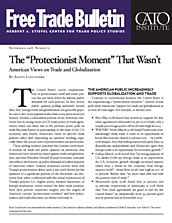The United States’ recent implementation of protectionist tariff and trade policies has not been driven by intense public demands for such policies. In fact, recent public opinion polling uniformly reveals that, first, foreign trade and globalization are generally popular, and in fact more popular today than at any point in recent history; second, a substantial portion of the American electorate has no strong views on U.S. trade policy or trade agreements; third, and likely due to the previous point, polls on trade fluctuate based on partisanship or the state of the U.S. economy; and, fourth, Americans’ views on specific trade policies often shift depending on question wording, especially when the actual costs of protectionism are mentioned.
These polling realities puncture the current conventional wisdom on trade and public opinion — in particular, that Americans have turned en masse against trade and globalization, and that President Donald Trump’s economic nationalism reflects the bottom-up policy demands of a silent majority of American voters. Instead, numerous surveys show that Trump’s protectionism drives (and is not itself driven by) the opinions of a significant portion of the electorate — an electorate that, when confronted with the actual implications of Trump’s policies (i.e., higher prices, harmed businesses, or foreign retaliation), moves toward the freer trade position. Such facts provide important insights into the origins of America’s current “protectionist problem” and how policymakers and trade advocates can better overcome it.

This work is licensed under a Creative Commons Attribution-NonCommercial-ShareAlike 4.0 International License.

